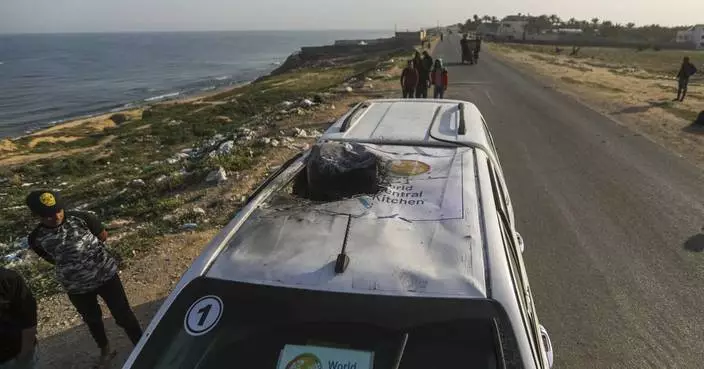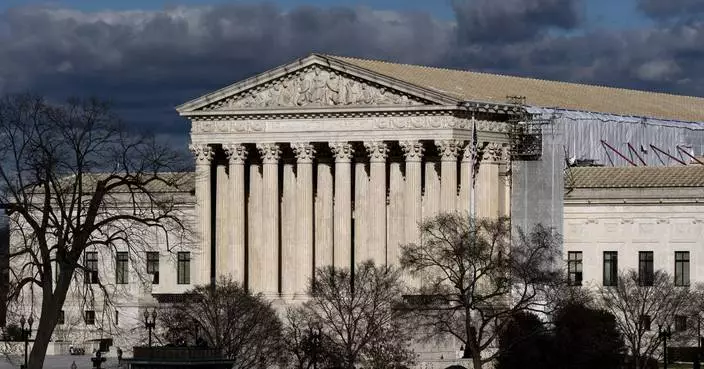A divided Supreme Court ruled Monday that businesses can prohibit their workers from banding together in disputes over pay and conditions in the workplace, a decision that affects an estimated 25 million non-unionized employees.
With the court's five conservative members in the majority, the justices held that individual employees can be forced to use arbitration, not the courts, to air complaints about wages and overtime. Four dissenting liberal justices said the decision will hit low-wage, vulnerable workers especially hard.
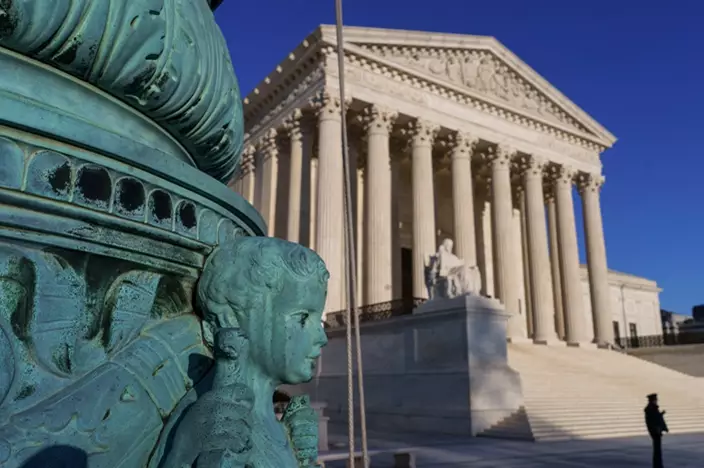
The Supreme Court is seen in Washington, April 20, 2018. The Supreme Court says employers can prohibit their workers from banding together to complain about pay and conditions in the workplace. (AP Photo/J. Scott Applewhite)
While the complaints in Monday's decision involved pay issues, the outcome also might extend to workplace discrimination and other disputes if employee contracts specify that they must be dealt with in one-on-one arbitration.
Workers who want to take action against sexual harassment, pay discrimination, pregnancy discrimination and racial discrimination "may now be forced behind closed doors into an individual, costly - and often secret - arbitration process," said Fatima Goss Graves, president and CEO of the National Women's Law Center.
Lawyers representing management said the decision protects businesses from endless, costly litigation.
The outcome does not affect people represented by labor unions, but an estimated 25 million employees work under contracts that prohibit collective action by employees who want to raise claims about some aspect of their employment.
The ruling reflected a years-long pattern at the Supreme Court of limiting class actions and favoring employer-favored arbitration over lawsuits in the courts, generally preferred by workers.
The Trump administration backed the businesses, reversing the position the Obama administration took in favor of employees.
The court's task was to reconcile federal laws that seemed to point in different directions. On the one hand, New Deal labor laws explicitly give workers the right to band together. On the other, the older Federal Arbitration Act encourages the use of arbitration, instead of the courts.
Justice Neil Gorsuch, writing for the majority, said the contracts are valid under the arbitration law. "As a matter of policy these questions are surely debatable. But as a matter of law the answer is clear," Gorsuch wrote.
Monday's ruling is in line with earlier decisions, he said. "In many cases over many years, this court has heard and rejected efforts to conjure conflicts between the Arbitration Act and other federal statutes. In fact, this court has rejected every such effort to date (save one temporary exception since overruled)," Gorsuch wrote.
In dissent for the court's liberals, Justice Ruth Bader Ginsburg called the decision "egregiously wrong" and likely to lead to "huge underenforcement of federal and state stautes designed to advance the well-being of vulnerable workers." Ginsburg said that the individual complaints can be very small in dollar terms, "scarcely of a size warranting the expense of seeking redress alone."
Ginsburg, who read a summary of her dissent aloud to stress her disagreement, said employees do not really have a choice about whether to sign such agreements, labeling them "arm-twisted, take-it-or-leave-it contracts."
She said "congressional action is urgently in order," echoing her call in 2007 for Congress to address pay discrimination following a high court ruling from which she dissented.
Kristen Clarke, president of the Lawyers' Committee for Civil Rights Under Law, said she fears the decision will have far-reaching effects. "Today's decision will make it easier for employers to escape liability for widespread discrimination and harassment. No American should be forced to sign away their right to invoke the meaningful protections afforded by our nation's critical civil rights laws," Clarke said.
The National Labor Relations Board, breaking with the administration, argued that contracts requiring employees to waive their right to collective action violate the labor laws.
Business interests were united in favor of the contracts. Gregory Jacob, a former high-ranking Labor Department official in the Bush administration, said the court got it right Monday. "This decision thus will not see a huge increase in the use of such provisions, but it does protect employers' settled expectations and avoids placing our nation's job providers under the threat of additional burdensome litigation drain," Jacob said.
Lower courts had split over the issue. The high court considered three cases — two in which appeals courts ruled that such agreements can't be enforced and a third in which an appeals court said they are valid.
VENICE, Italy (AP) — Under the gaze of the world’s media, the fragile lagoon city of Venice launched a pilot program Thursday to charge day-trippers a 5-euro (around $5.35) entry fee that authorities hope will discourage visitors from arriving on peak days and make the city more livable for its dwindling residents.
Visitors arriving at Venice's main train station were greeted with large signs listing the 29 dates through July of the plan's test phase, as well as new entrances separating tourists from residents, students and workers.
Stewards were on hand to politely guide anyone unaware of the new requirements through the process of downloading the QR code to pay the fee.
“We need to find a new balance between the tourists and residents,’’ said the city’s top tourism official, Simone Venturini. “We need to safeguard the spaces of the residents, of course, and we need to discourage the arrival of day-trippers on some particular days.”
Arianna Cecilia, who lives in Rome and was visiting Venice for the first time with her boyfriend, said it felt “strange" to have to buy a ticket to enter a city in her native Italy, and then pass through a tourist entrance.
The couple were staying in nearby Treviso, and had paid the fee and downloaded the QR code as required prior to arrival.
Workers in yellow vests carried out random checks at the train station, and anyone caught faces fines of 50 euros to 300 euros — though officials said “common sense” was being applied for the launch.
The requirement applies only for people arriving between 8:30 a.m. and 4 p.m. Outside of those hours, access is free and unchecked.
Venice has long suffered under the pressure of over-tourism, and officials hope the pilot project can help provide more exact figures to better manage the phenomenon.
The city can track the number of hotel visitors — which last year numbered 4.6 million, down 16% from pre-pandemic highs. But the number of day visitors, which make up the majority of the crowds in Venice, could only be estimated until recently.
A Smart Control Room set up during the pandemic has been tracking arrivals from cell phone data, roughly confirming pre-pandemic estimates of 25 million to 30 million arrivals a year, said Michele Zuin, the city’s top economic official. That includes both day-trippers and overnight guests.
But Zuin said the data is incomplete. “It’s clear we will get more reliable data from the contribution” being paid by day-trippers, he said.
Venturini said the city is strained when the number of day-trippers reaches 30,000 to 40,000. Its narrow alleyways are clogged with people and water taxis packed, making it difficult for residents to go about their business.
Not all residents, however, are persuaded of the efficacy of the new system in dissuading mass tourism. Some say more attention needs to be paid to boosting the resident population and services they need.
Venice last year passed a telling milestone when the number of tourist beds exceeded for the first time the number of official residents, which is now below 50,000 in the historic center with its picturesque canals.
“Putting a ticket to enter a city will not decrease not even by one single unit the number of visitors that are coming,’’ said Tommaso Cacciari, an activist who organized a protest Thursday against the measure.
“You pay a ticket to take the metro, to go to a museum, an amusement park; you don’t pay a ticket to enter a city. This is the last symbolic step of a project of an idea of this municipal administration to kick residents out of Venice,” he said.
Venturini said about 6,000 people had already paid to download the QR code, and officials expect paid day-tripper arrivals Thursday to reach some 10,000.
More than 70,000 others have downloaded a QR code denoting an exemption, including to work in Venice or as a resident of the Veneto region. People staying in hotels in Venice, including in mainland districts like Marghera or Mestre, should get a QR code attesting to their stay, which includes a hotel tax.
The tourist official says interest in Venice's pilot program has been keen from other places suffering from mass tourism, including other Italian art cities and cities abroad such as Barcelona and Amsterdam.
Marina Rodino, who has lived in Venice for 30 years, is opposed to the new plan. She was passing out mock EU passports for “Venice, Open City,” underlining the irony of the new system, and challenging its legal standing with citations from the Italian constitution guaranteeing its citizens the right to “move or reside freely in any part of the national territory."
Rodino has seen her local butcher close and families leave her neighborhood near the famed Rialto Bridge as short-term apartment rentals spring up. But she said the new entrance fee requirement will still allow young people to flood the city in the evening for often rowdy gatherings.
“This is not a natural oasis. This is not a museum. It is not Pompeii," she said. “It is a city, where we need to fight so the houses are inhabited by families, and stores reopen. That is what would counter this wild tourism.”
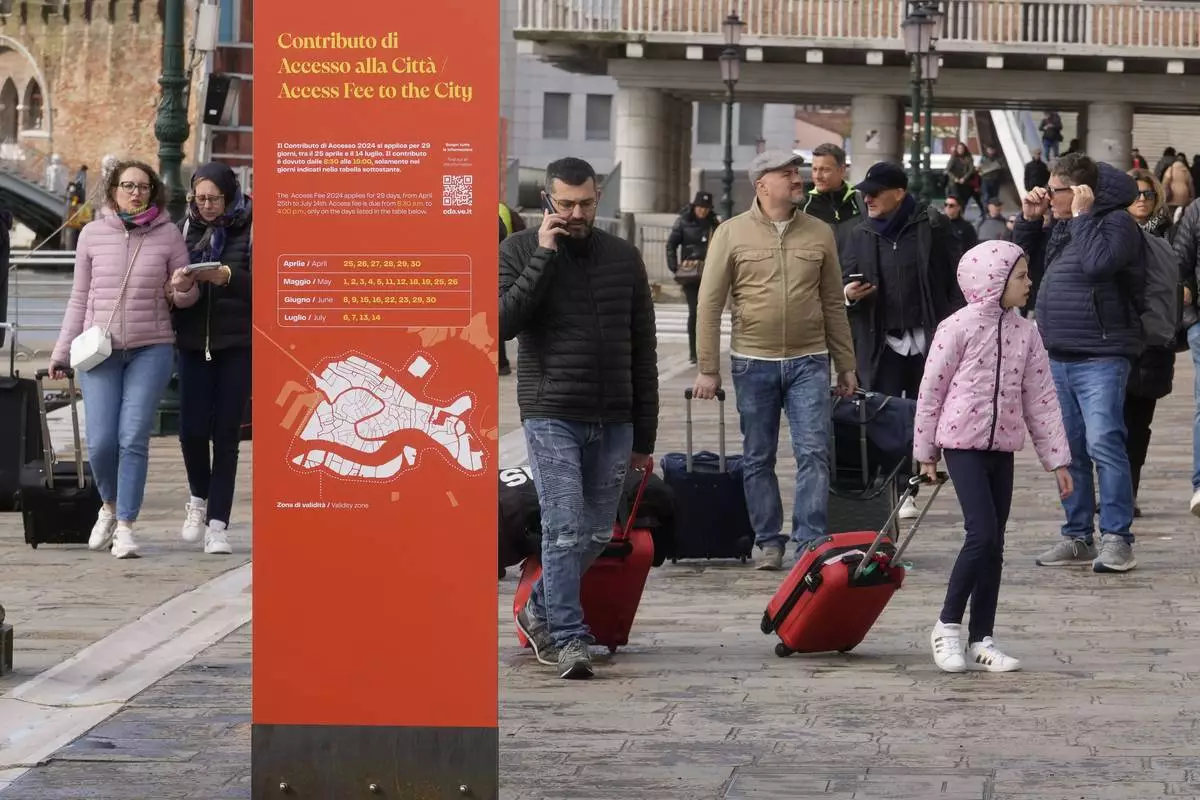
Tourists arrive in Venice, Italy, Thursday, April 25, 2024. The fragile lagoon city of Venice begins a pilot program Thursday to charge daytrippers a 5 euro entry fee that authorities hope will discourage tourists from arriving on peak days. The daytripper tax is being tested on 29 days through July, mostly weekends and holidays starting with Italy's Liberation Day holiday Thursday. Officials expect some 10,000 people will pay the fee to access the city on the first day, downloading a QR code to prove their payment, while another 70,000 will receive exceptions, for example, because they work in Venice or live in the Veneto region. (AP Photo/Luca Bruno)
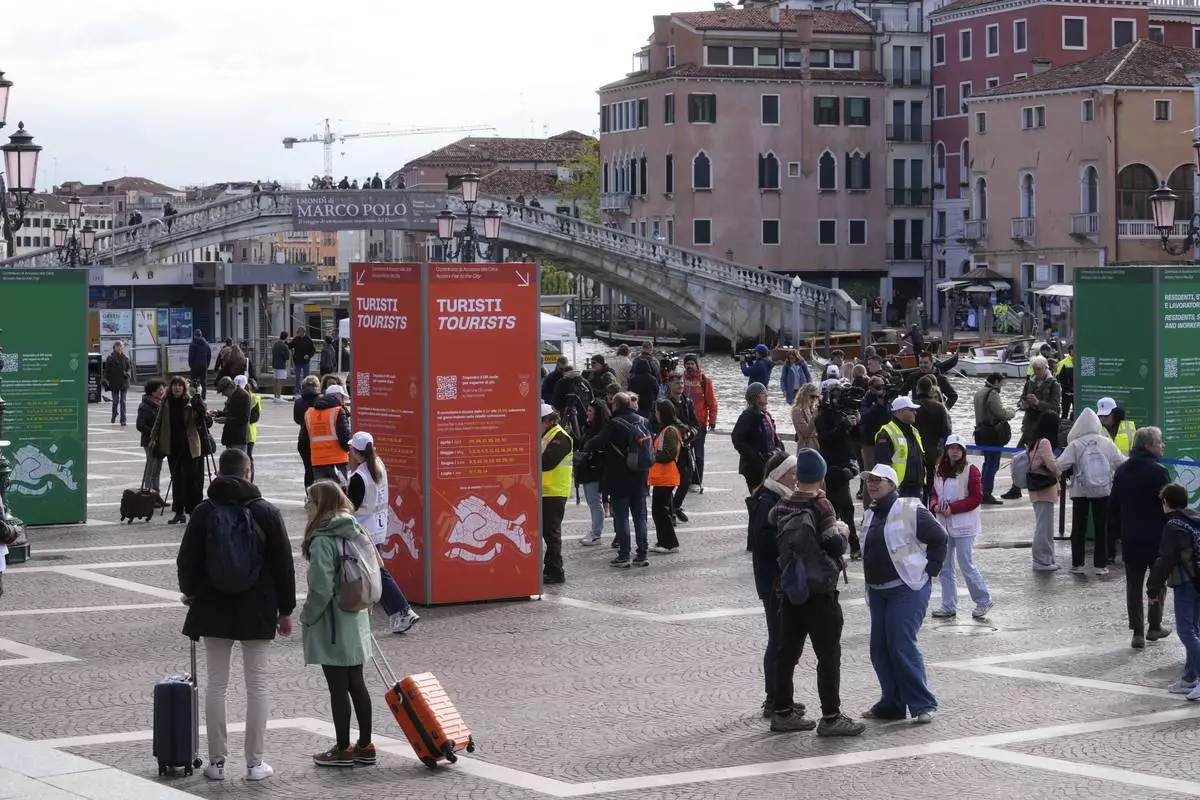
Stewards check tourists QR code access outside the main train station in Venice, Italy, Thursday, April 25, 2024. The fragile lagoon city of Venice begins a pilot program Thursday to charge daytrippers a 5 euro entry fee that authorities hope will discourage tourists from arriving on peak days. The daytripper tax is being tested on 29 days through July, mostly weekends and holidays starting with Italy's Liberation Day holiday Thursday. Officials expect some 10,000 people will pay the fee to access the city on the first day, downloading a QR code to prove their payment, while another 70,000 will receive exceptions, for example, because they work in Venice or live in the Veneto region. (AP Photo/Luca Bruno)
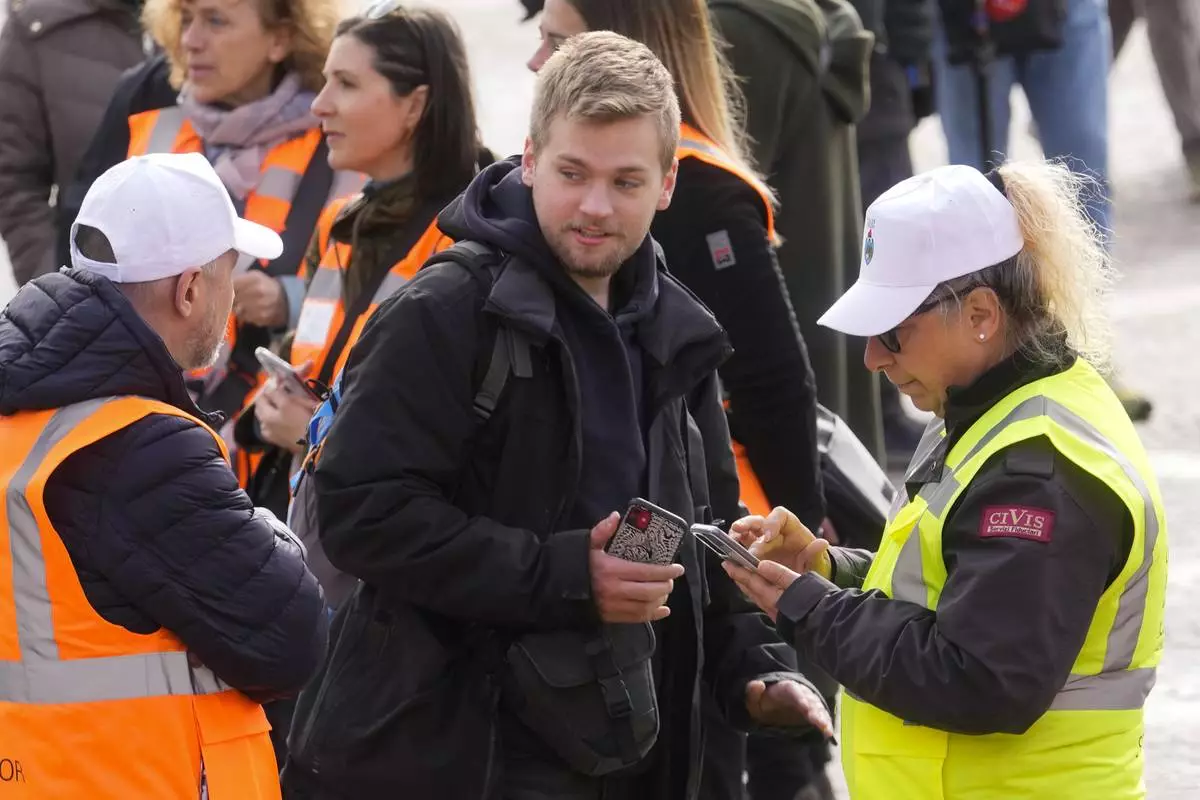
Stewards check a tourist QR code access outside the main train station in Venice, Italy, Thursday, April 25, 2024. The fragile lagoon city of Venice begins a pilot program Thursday to charge daytrippers a 5 euro entry fee that authorities hope will discourage tourists from arriving on peak days. The daytripper tax is being tested on 29 days through July, mostly weekends and holidays starting with Italy's Liberation Day holiday Thursday. Officials expect some 10,000 people will pay the fee to access the city on the first day, downloading a QR code to prove their payment, while another 70,000 will receive exceptions, for example, because they work in Venice or live in the Veneto region. (AP Photo/Luca Bruno)
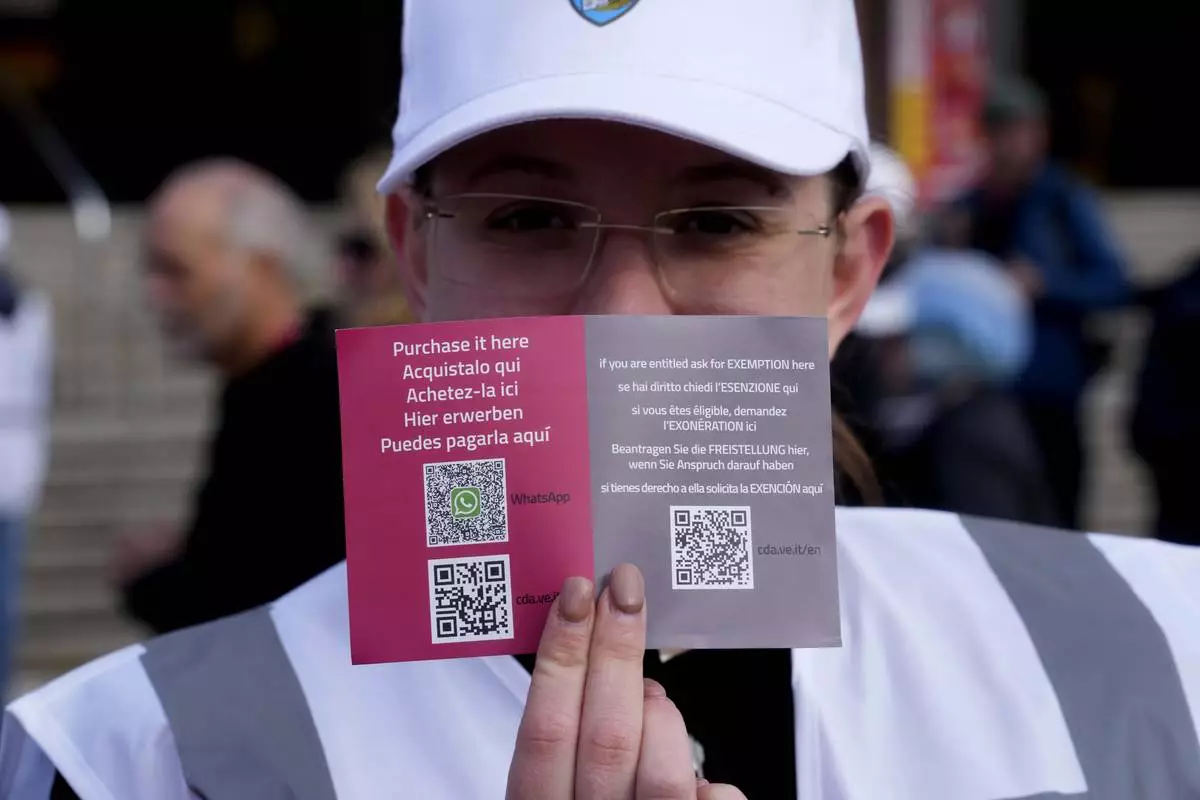
A steward shows the QR code access outside the main train station in Venice, Italy, Thursday, April 25, 2024. The fragile lagoon city of Venice begins a pilot program Thursday to charge daytrippers a 5 euro entry fee that authorities hope will discourage tourists from arriving on peak days. The daytripper tax is being tested on 29 days through July, mostly weekends and holidays starting with Italy's Liberation Day holiday Thursday. Officials expect some 10,000 people will pay the fee to access the city on the first day, downloading a QR code to prove their payment, while another 70,000 will receive exceptions, for example, because they work in Venice or live in the Veneto region. (AP Photo/Luca Bruno)
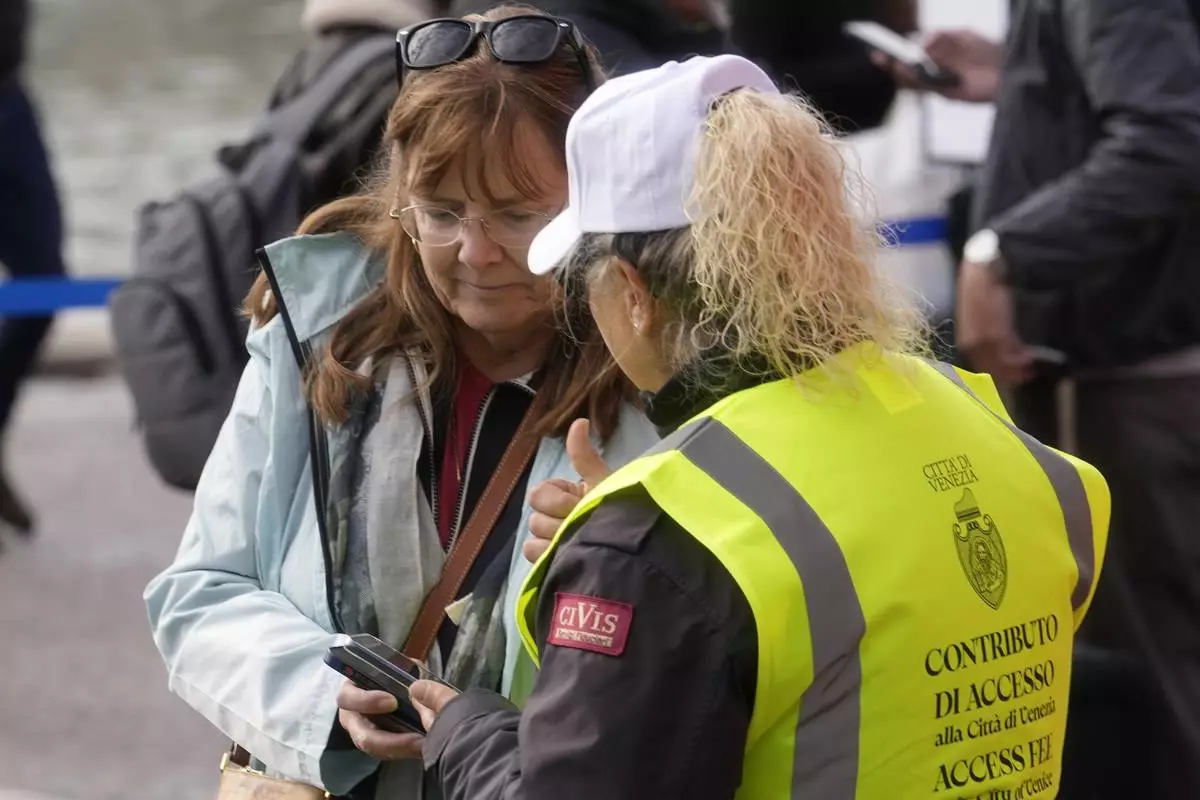
A steward checks a tourist QR code access outside the main train station in Venice, Italy, Thursday, April 25, 2024. The fragile lagoon city of Venice begins a pilot program Thursday to charge daytrippers a 5 euro entry fee that authorities hope will discourage tourists from arriving on peak days. The daytripper tax is being tested on 29 days through July, mostly weekends and holidays starting with Italy's Liberation Day holiday Thursday. Officials expect some 10,000 people will pay the fee to access the city on the first day, downloading a QR code to prove their payment, while another 70,000 will receive exceptions, for example, because they work in Venice or live in the Veneto region. (AP Photo/Luca Bruno)
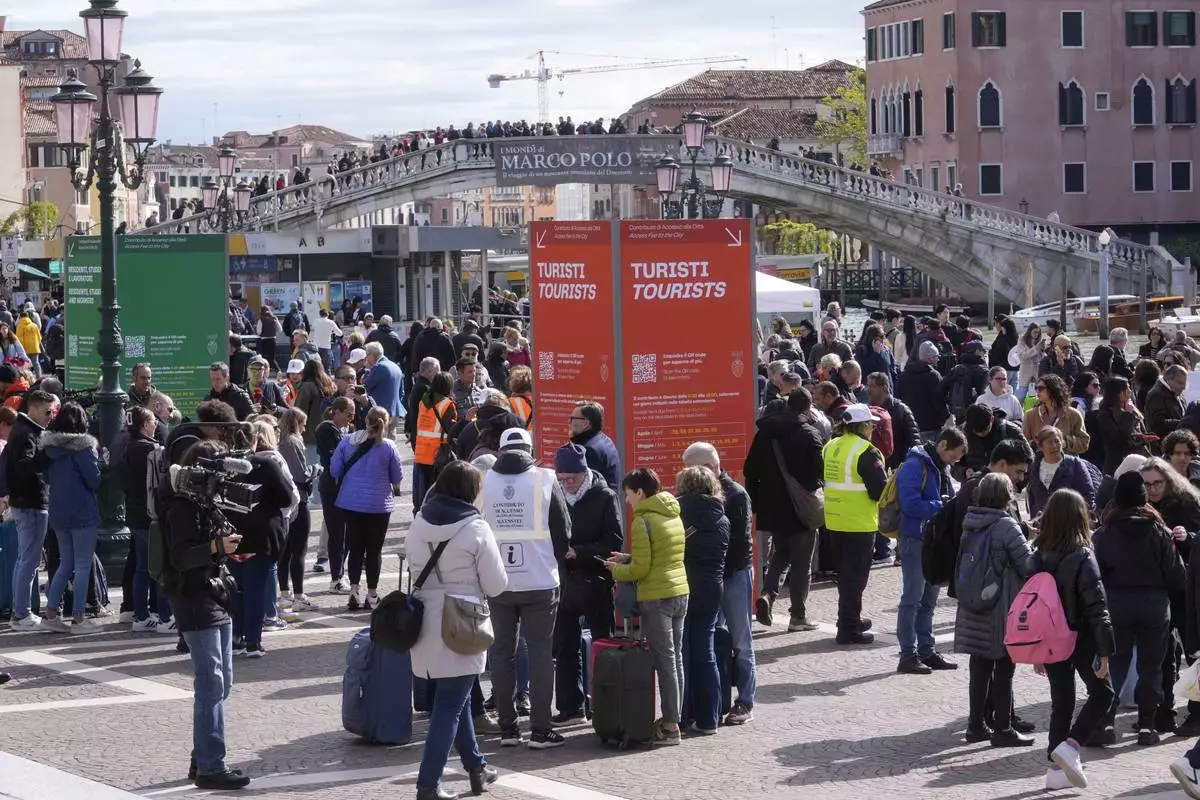
Stewards check tourists QR code access outside the main train station in Venice, Italy, Thursday, April 25, 2024. The fragile lagoon city of Venice begins a pilot program Thursday to charge daytrippers a 5 euro entry fee that authorities hope will discourage tourists from arriving on peak days. The daytripper tax is being tested on 29 days through July, mostly weekends and holidays starting with Italy's Liberation Day holiday Thursday. Officials expect some 10,000 people will pay the fee to access the city on the first day, downloading a QR code to prove their payment, while another 70,000 will receive exceptions, for example, because they work in Venice or live in the Veneto region. (AP Photo/Luca Bruno)
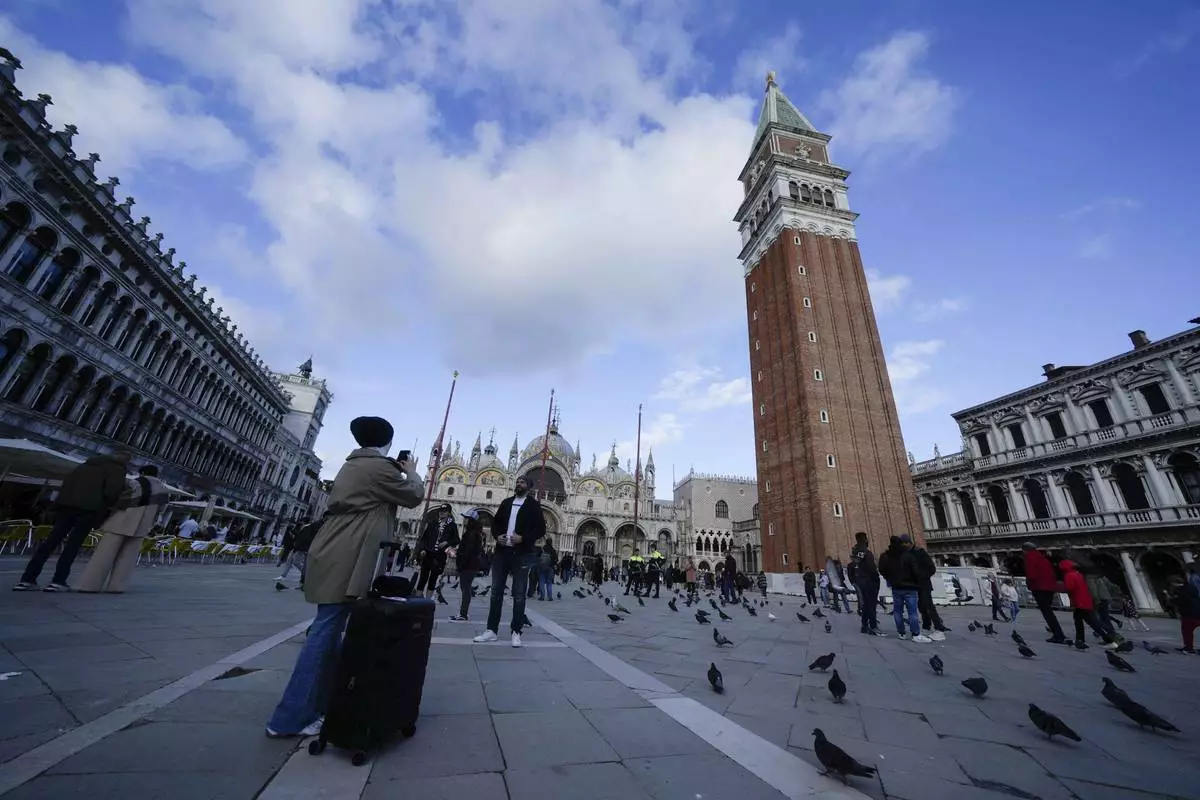
Tourists take pictures at the St. Mark square in Venice, Italy, Wednesday, April 24, 2024. The lagoon city of Venice begins a pilot program Thursday, April 25, 2024 to charge daytrippers a 5 euro entry fee that authorities hope will discourage tourists from arriving on peak days. Officials expect some 10,000 people will pay the fee to access the city on the first day, downloading a QR code to prove their payment. (AP Photo/Luca Bruno)
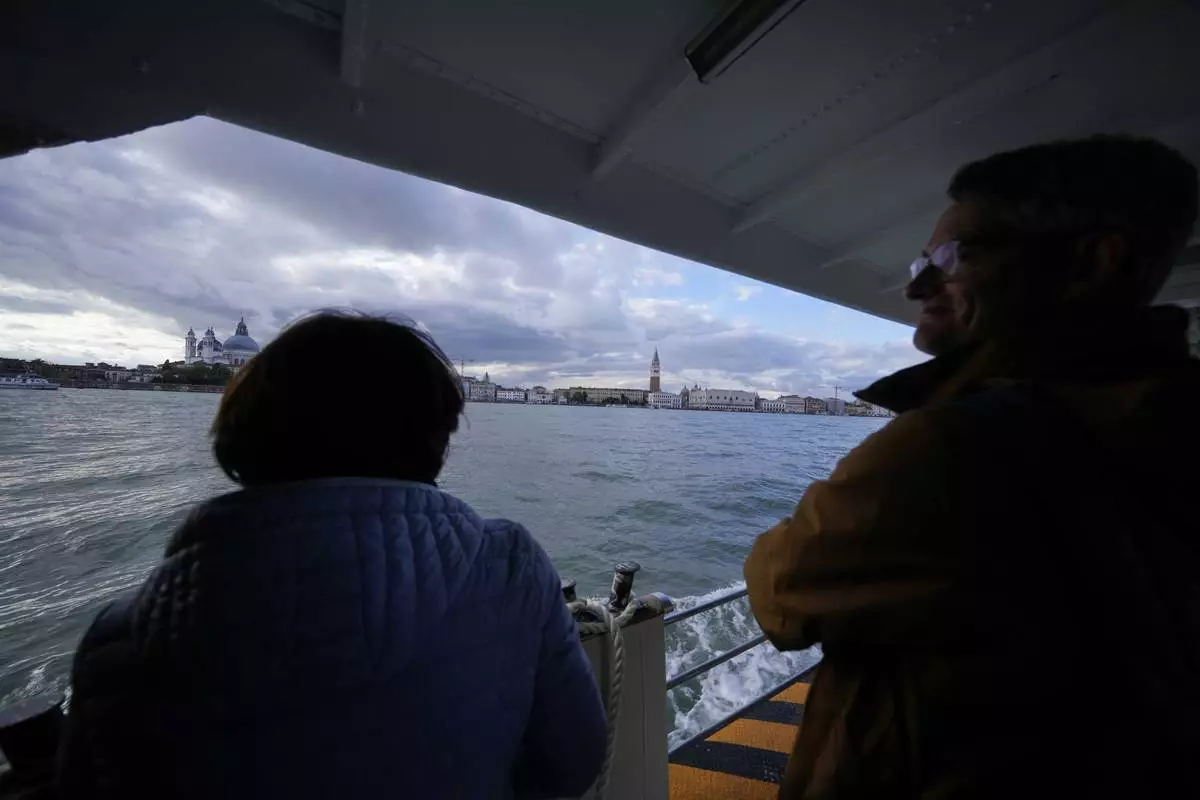
Tourists ride on a ferry boat in Venice, Italy, Wednesday, April 24, 2024. The lagoon city of Venice begins a pilot program Thursday, April 25, 2024 to charge daytrippers a 5 euro entry fee that authorities hope will discourage tourists from arriving on peak days. Officials expect some 10,000 people will pay the fee to access the city on the first day, downloading a QR code to prove their payment. (AP Photo/Luca Bruno)
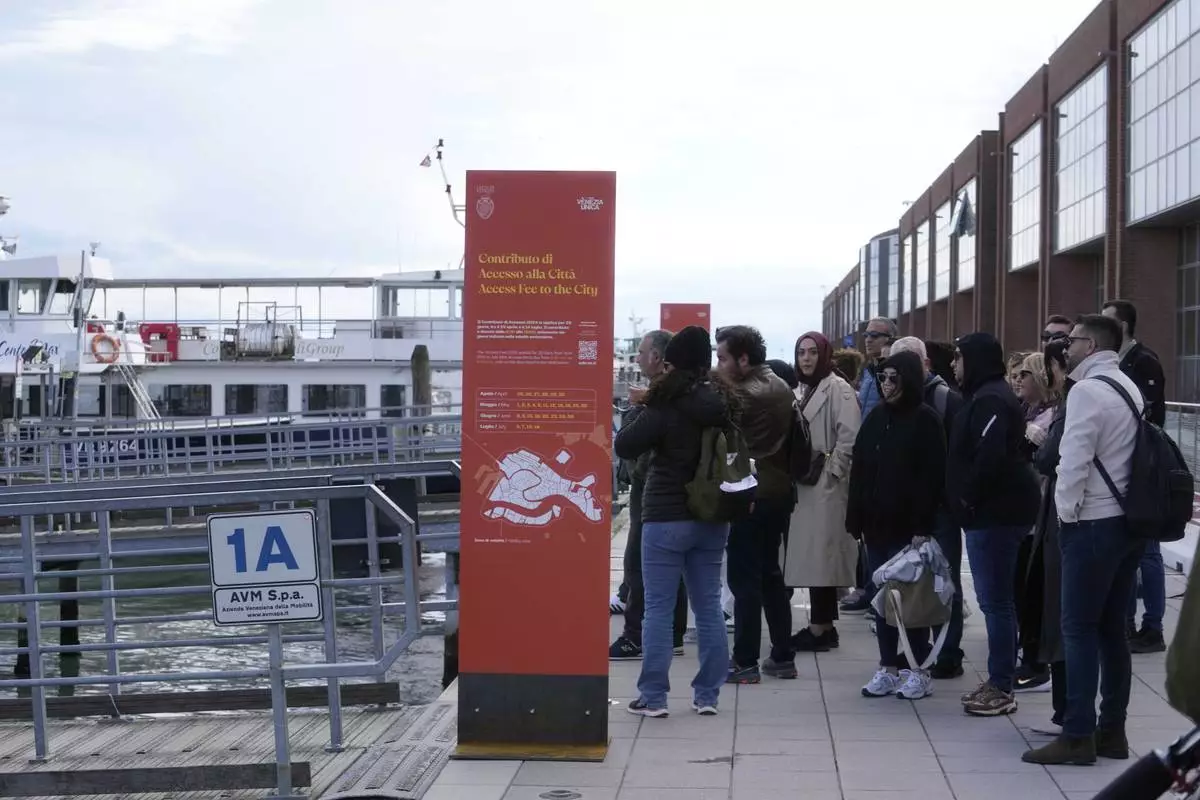
People stand in front of an information board explaining how to pay the tourist tax in Venice, Italy, Wednesday, April 24, 2024. The lagoon city of Venice begins a pilot program Thursday, April 25, 2024 to charge daytrippers a 5 euro entry fee that authorities hope will discourage tourists from arriving on peak days. Officials expect some 10,000 people will pay the fee to access the city on the first day, downloading a QR code to prove their payment. (AP Photo/Luca Bruno)

Marco Bettini, director of Venis Informatics System, gestures as he talks to reporters at the police Venice control room, in Venice, Italy, Wednesday, April 24, 2024. The lagoon city of Venice begins a pilot program Thursday, April 25, 2024 to charge daytrippers a 5 euro entry fee that authorities hope will discourage tourists from arriving on peak days. Officials expect some 10,000 people will pay the fee to access the city on the first day, downloading a QR code to prove their payment. (AP Photo/Luca Bruno)
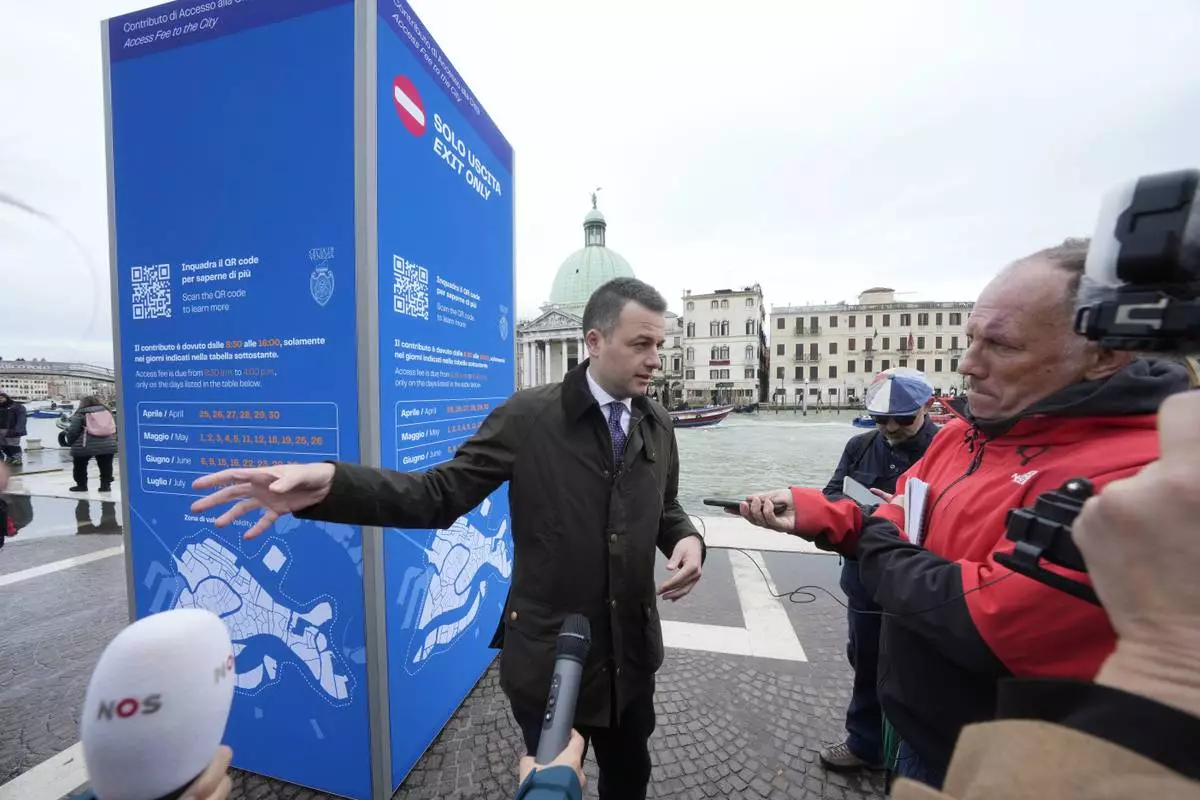
Venice councillor Simone Venturini speaks with reporters in front of a tourist tax totem in Venice, Italy, Wednesday, April 24, 2024. The lagoon city of Venice begins a pilot program Thursday, April 25, 2024 to charge daytrippers a 5 euro entry fee that authorities hope will discourage tourists from arriving on peak days. Officials expect some 10,000 people will pay the fee to access the city on the first day, downloading a QR code to prove their payment. (AP Photo/Luca Bruno)
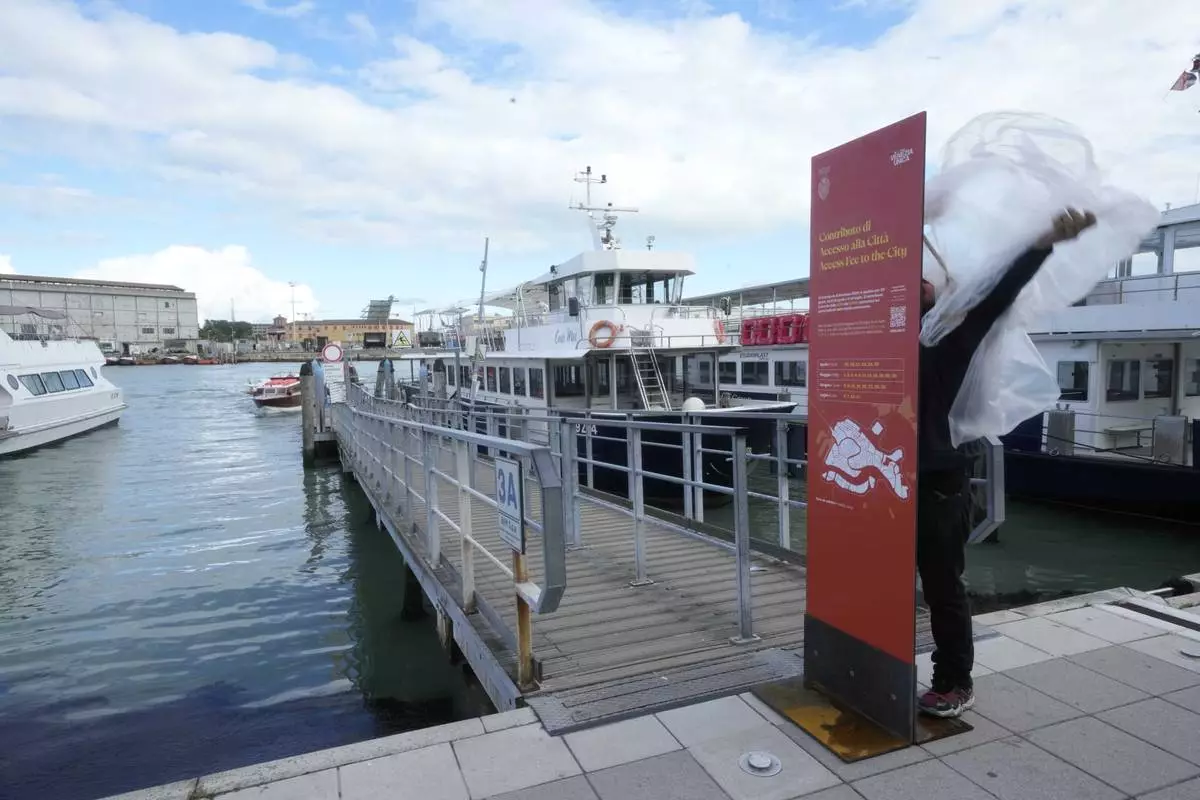
Workers prepare banner explaining how to pay the tourist tax in Venice, Italy, Wednesday, April 24, 2024. The lagoon city of Venice begins a pilot program Thursday, April 25, 2024 to charge daytrippers a 5 euro entry fee that authorities hope will discourage tourists from arriving on peak days. Officials expect some 10,000 people will pay the fee to access the city on the first day, downloading a QR code to prove their payment. (AP Photo/Luca Bruno)
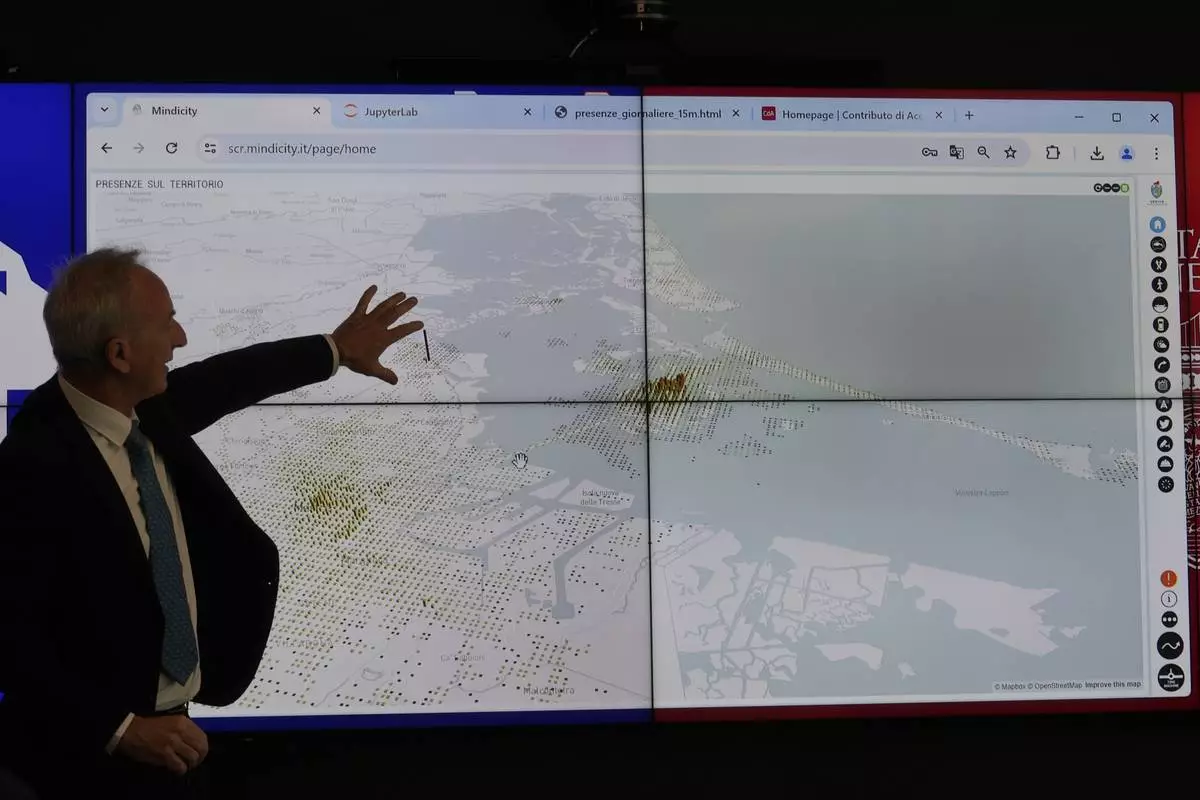
Marco Bettini, director of Venis Informatics System, gestures as he explains the Venice density to reporters at the police Venice control room in Venice, Italy, Wednesday, April 24, 2024. The lagoon city of Venice begins a pilot program Thursday, April 25, 2024 to charge daytrippers a 5 euro entry fee that authorities hope will discourage tourists from arriving on peak days. Officials expect some 10,000 people will pay the fee to access the city on the first day, downloading a QR code to prove their payment. (AP Photo/Luca Bruno)
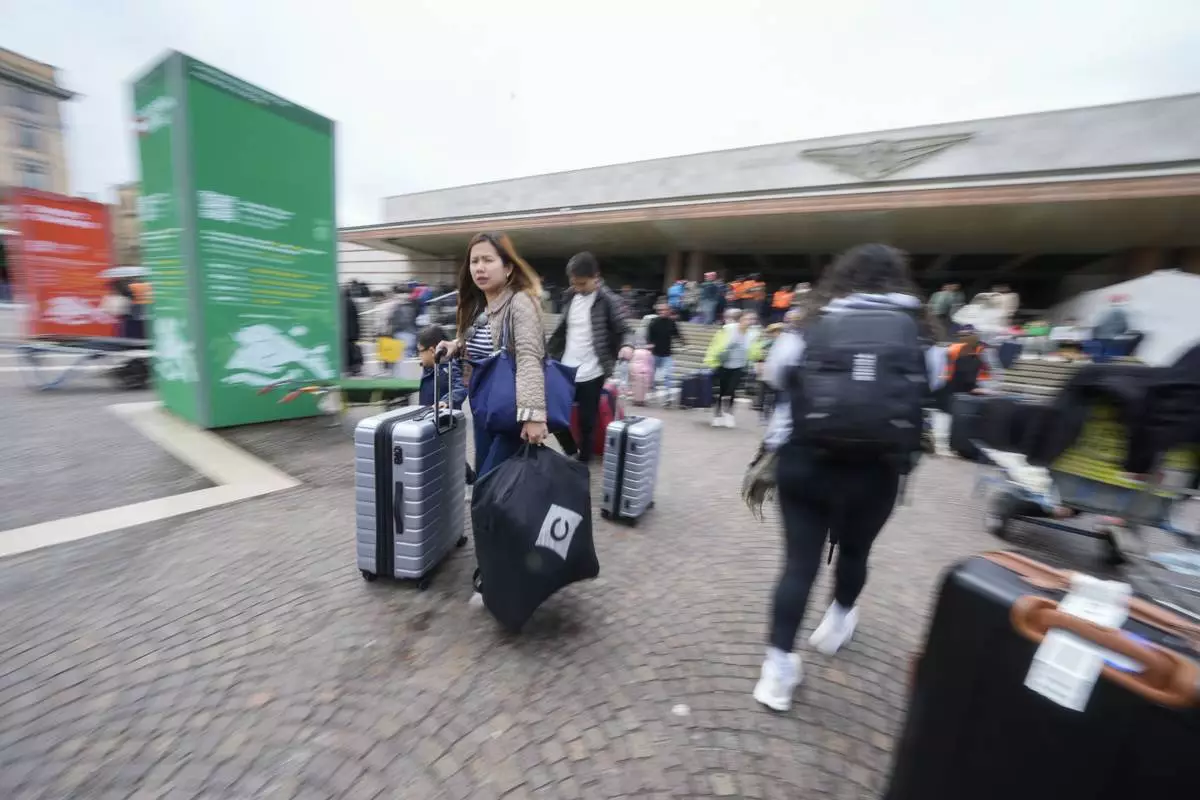
Tourists arrive at the main train station in Venice, Italy, Wednesday, April 24, 2024. The lagoon city of Venice begins a pilot program Thursday, April 25, 2024 to charge daytrippers a 5 euro entry fee that authorities hope will discourage tourists from arriving on peak days. Officials expect some 10,000 people will pay the fee to access the city on the first day, downloading a QR code to prove their payment. (AP Photo/Luca Bruno)
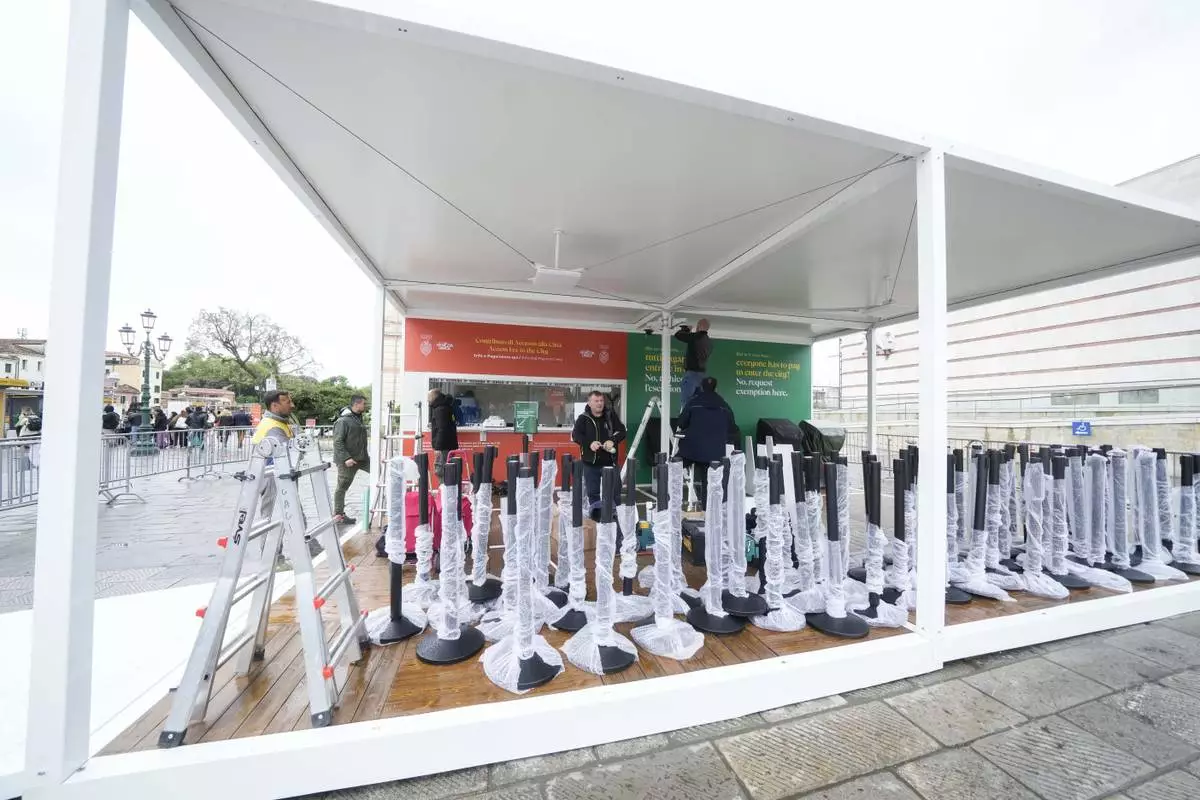
Workers prepare the tourist tax cashier desks outside the main train station in Venice, Italy, Wednesday, April 24, 2024. The lagoon city of Venice begins a pilot program Thursday, April 25, 2024 to charge daytrippers a 5 euro entry fee that authorities hope will discourage tourists from arriving on peak days. Officials expect some 10,000 people will pay the fee to access the city on the first day, downloading a QR code to prove their payment. (AP Photo/Luca Bruno)
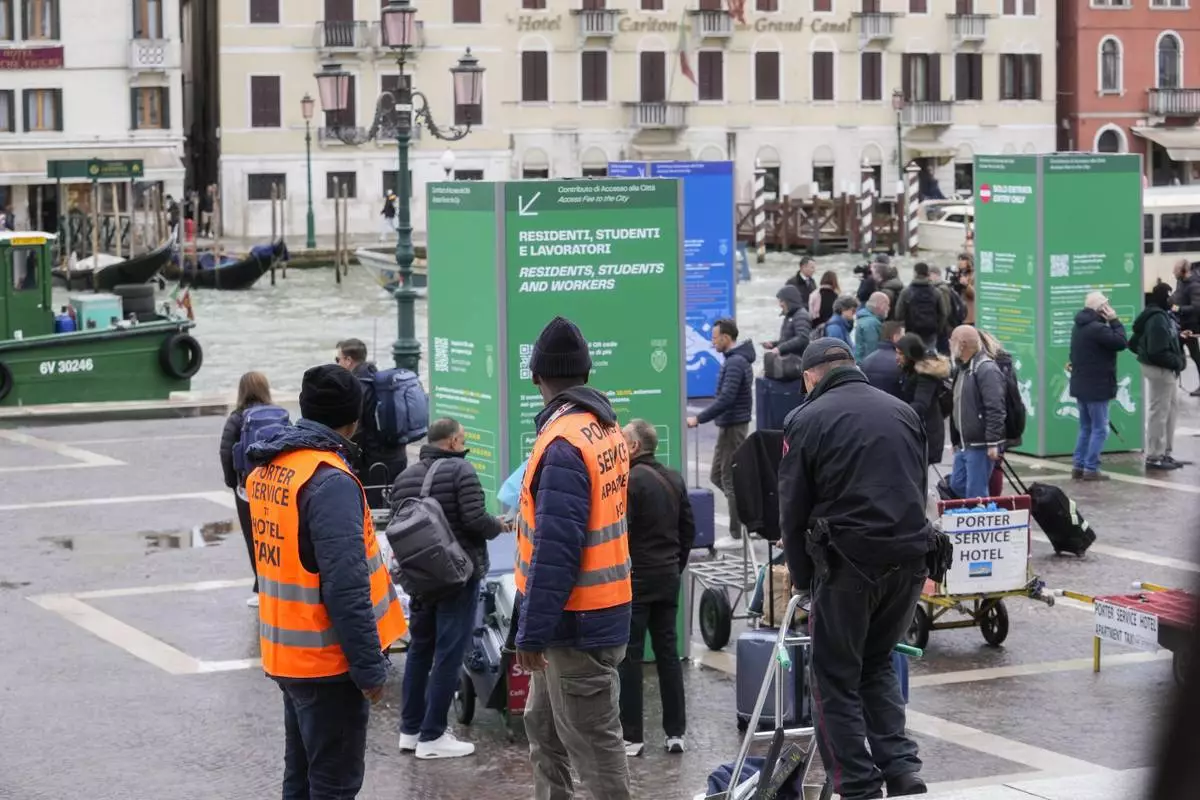
Porters wait for tourists outside the main train station in Venice, Italy, Wednesday, April 24, 2024. The lagoon city of Venice begins a pilot program Thursday, April 25, 2024 to charge daytrippers a 5 euro entry fee that authorities hope will discourage tourists from arriving on peak days. Officials expect some 10,000 people will pay the fee to access the city on the first day, downloading a QR code to prove their payment. (AP Photo/Luca Bruno)
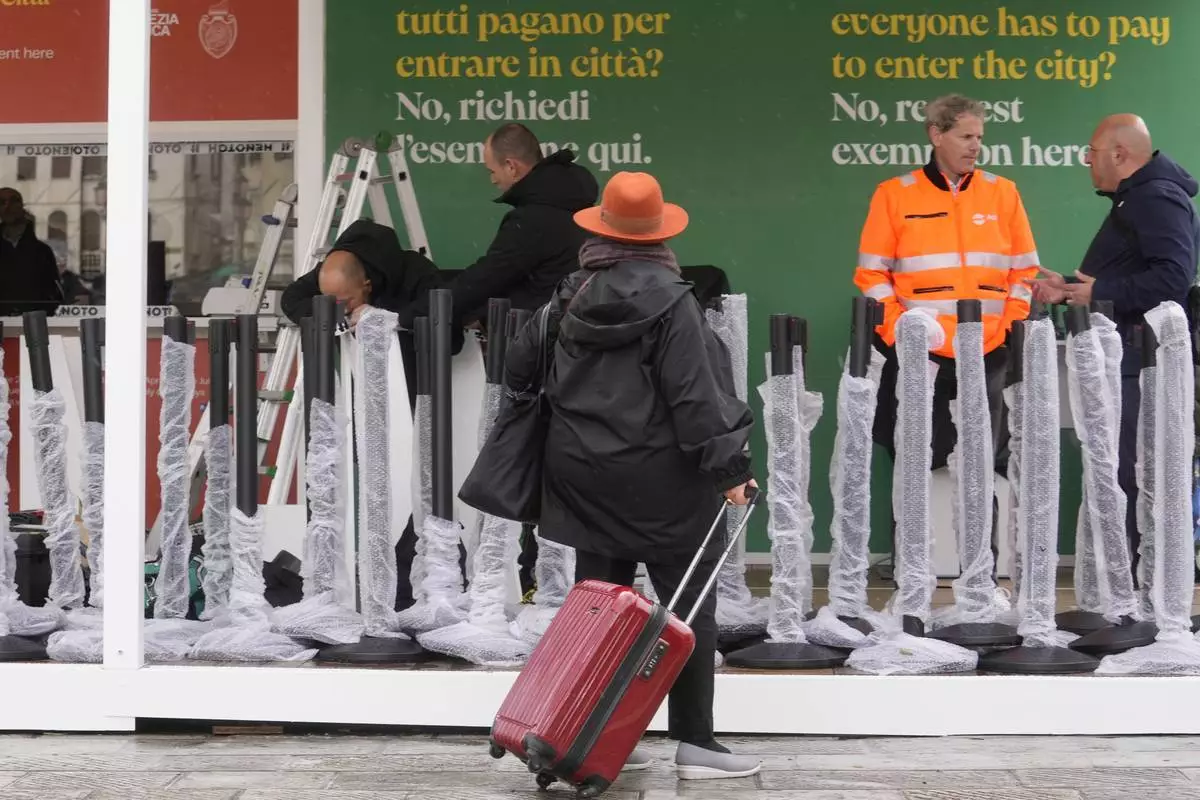
Workers prepare the tourist tax cashier desks outside the main train station in Venice, Italy, Wednesday, April 24, 2024. The lagoon city of Venice begins a pilot program Thursday, April 25, 2024 to charge daytrippers a 5 euro entry fee that authorities hope will discourage tourists from arriving on peak days. Officials expect some 10,000 people will pay the fee to access the city on the first day, downloading a QR code to prove their payment. (AP Photo/Luca Bruno)
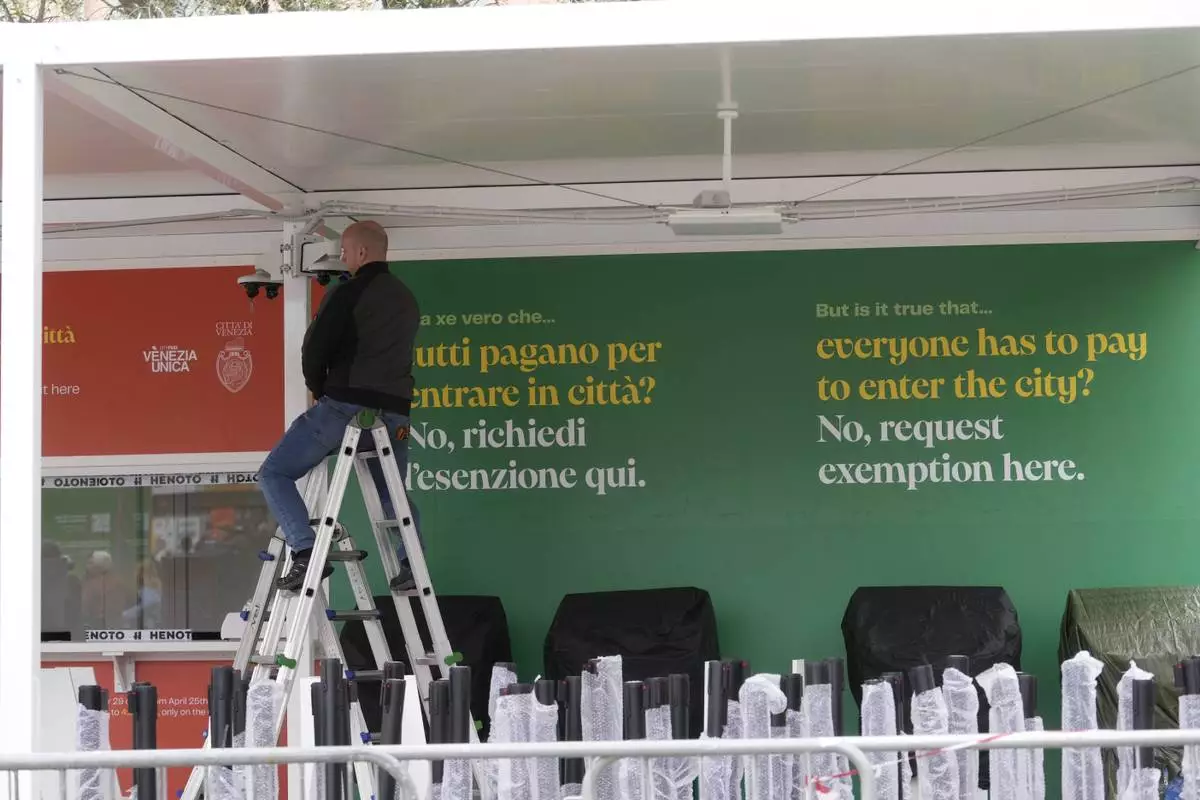
Workers prepare the tourist tax cashier desks outside the main train station in Venice, Italy, Wednesday, April 24, 2024. The lagoon city of Venice begins a pilot program Thursday, April 25, 2024 to charge daytrippers a 5 euro entry fee that authorities hope will discourage tourists from arriving on peak days. Officials expect some 10,000 people will pay the fee to access the city on the first day, downloading a QR code to prove their payment. (AP Photo/Luca Bruno)
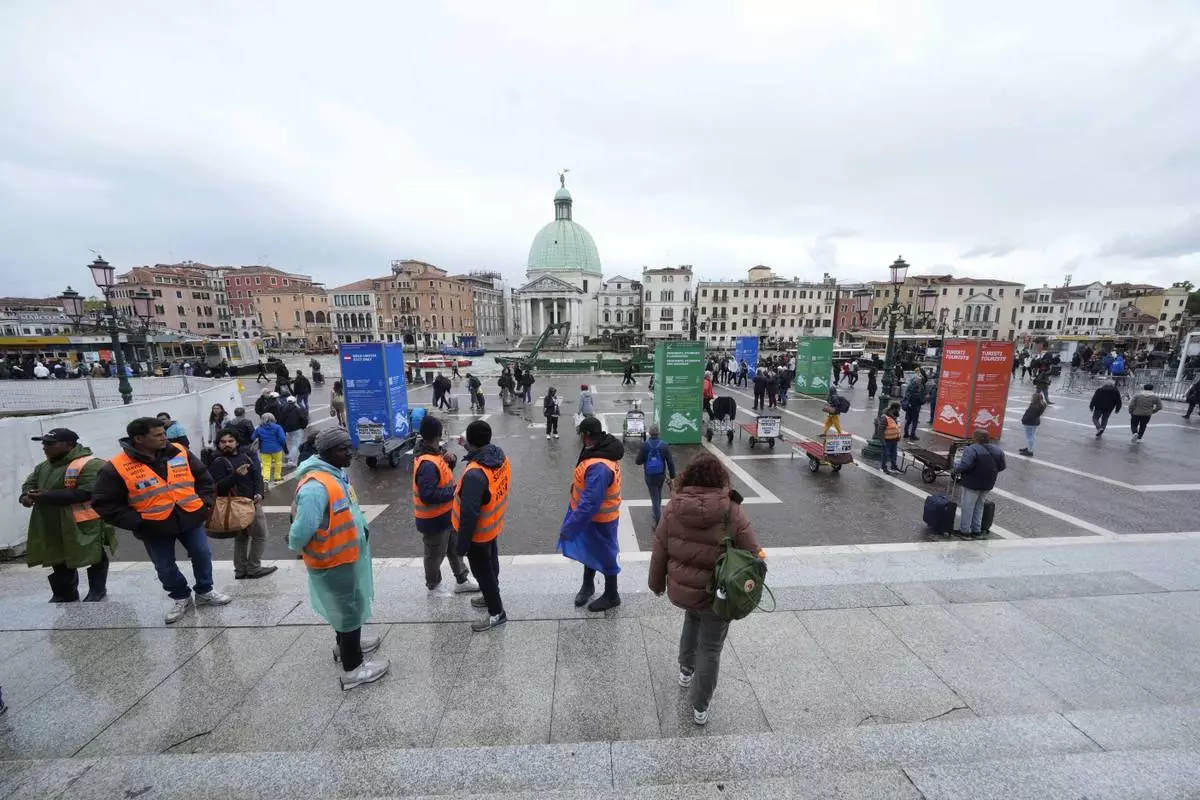
Porters wait for tourists outside the main train station in Venice, Italy, Wednesday, April 24, 2024. The lagoon city of Venice begins a pilot program Thursday, April 25, 2024 to charge daytrippers a 5 euro entry fee that authorities hope will discourage tourists from arriving on peak days. Officials expect some 10,000 people will pay the fee to access the city on the first day, downloading a QR code to prove their payment. (AP Photo/Luca Bruno)
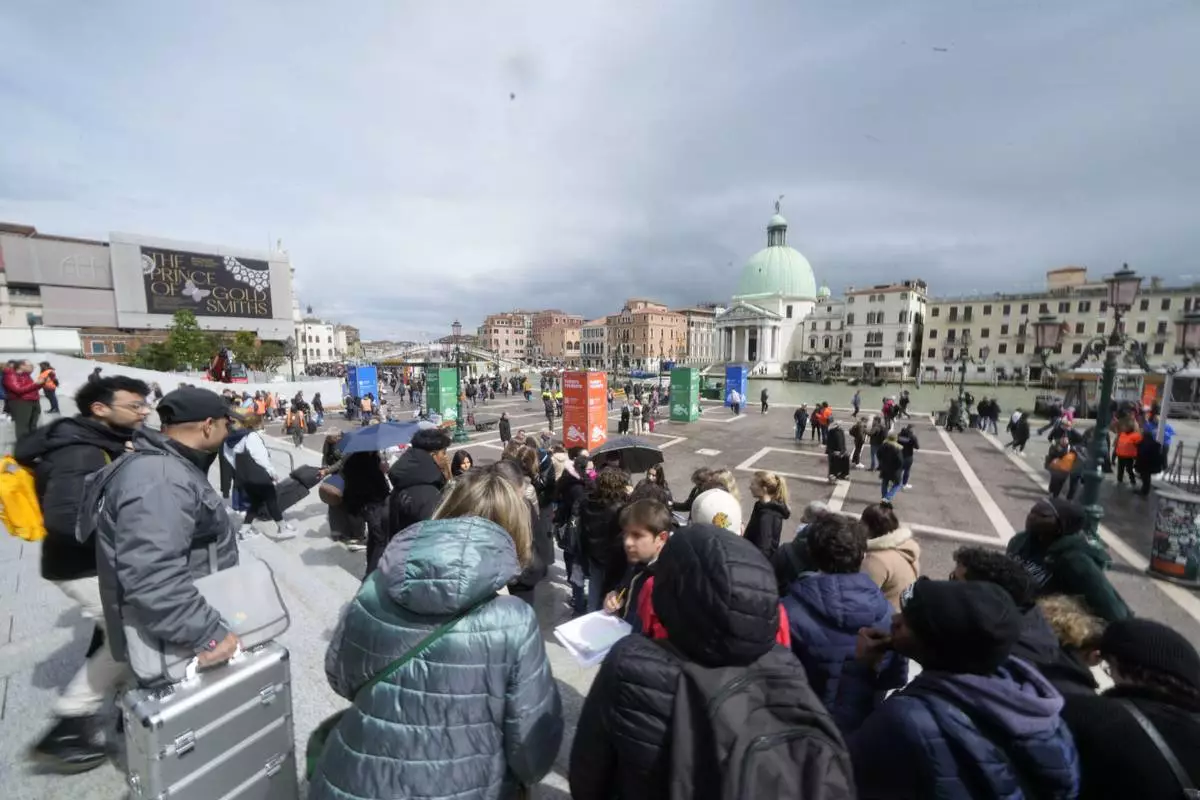
Tourists arrive outside the main train station in Venice, Italy, Wednesday, April 24, 2024. The lagoon city of Venice begins a pilot program Thursday, April 25, 2024 to charge daytrippers a 5 euro entry fee that authorities hope will discourage tourists from arriving on peak days. Officials expect some 10,000 people will pay the fee to access the city on the first day, downloading a QR code to prove their payment. (AP Photo/Luca Bruno)
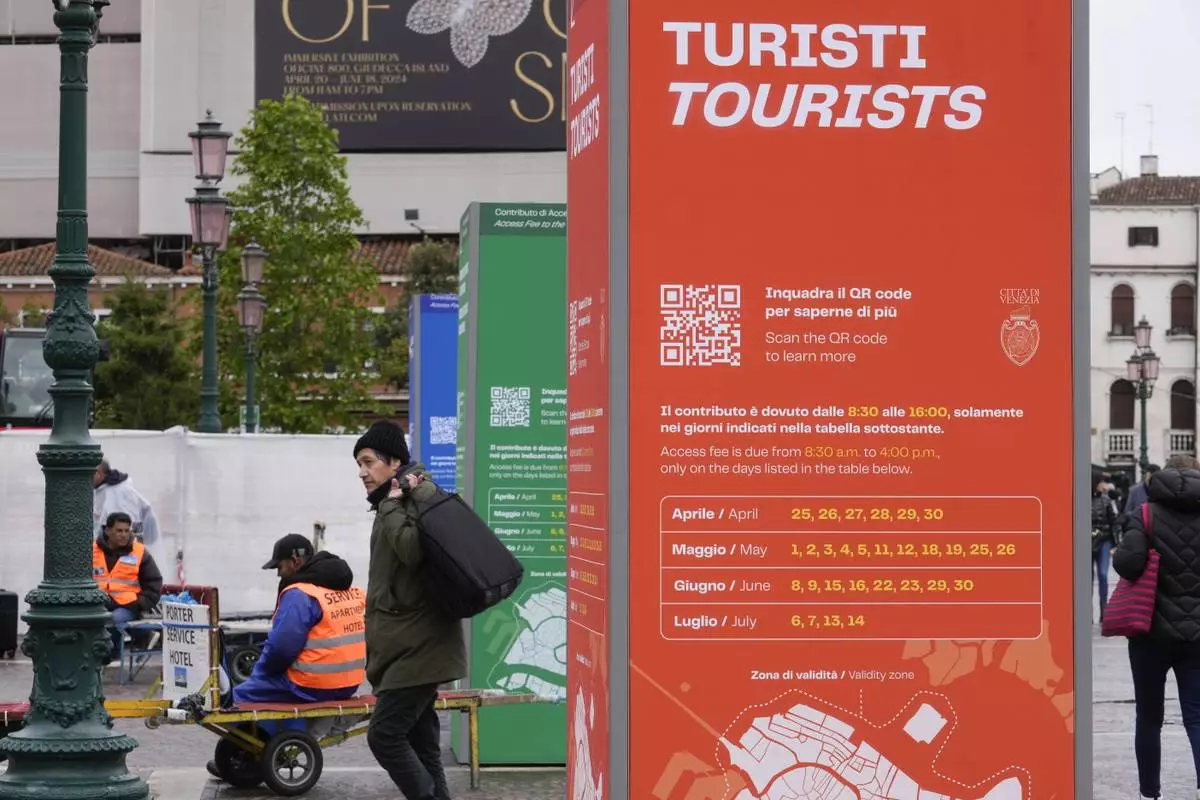
Tourist information boards are seen outside the main train station in Venice, Italy, Wednesday, April 24, 2024. The lagoon city of Venice begins a pilot program Thursday, April 25, 2024 to charge daytrippers a 5 euro entry fee that authorities hope will discourage tourists from arriving on peak days. Officials expect some 10,000 people will pay the fee to access the city on the first day, downloading a QR code to prove their payment. (AP Photo/Luca Bruno)
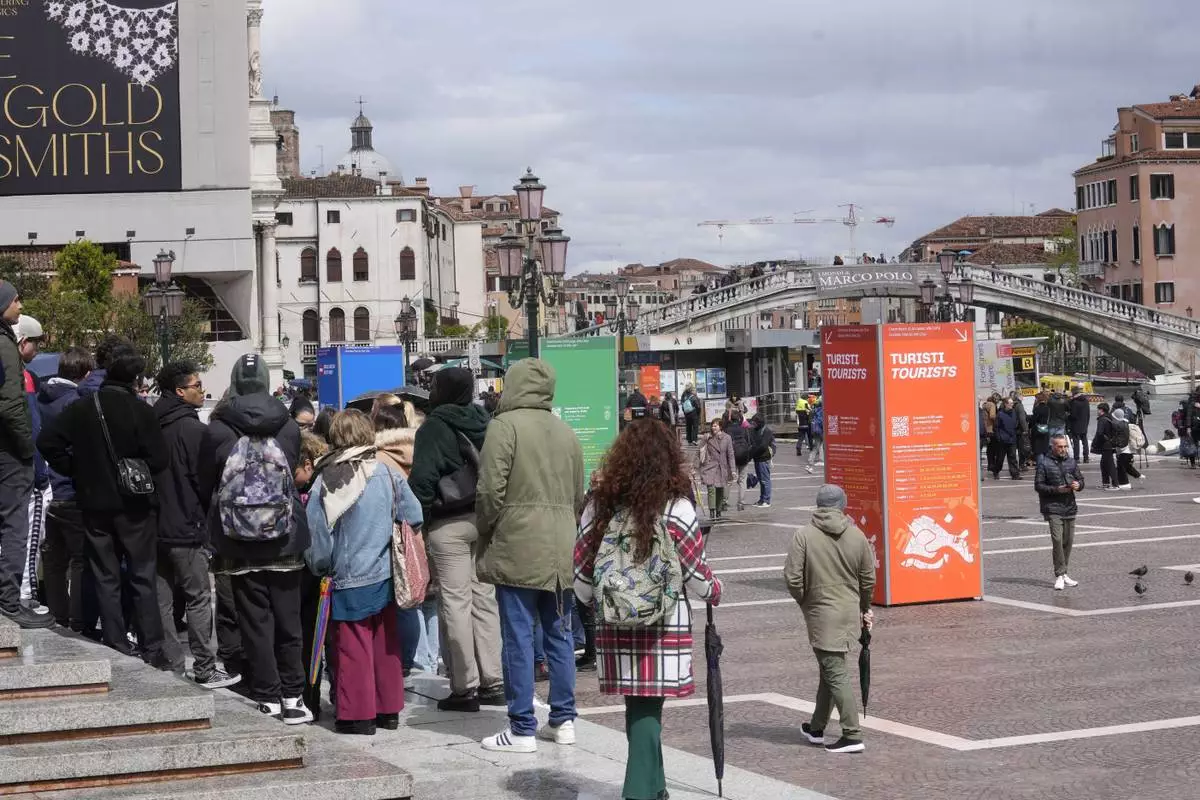
Tourists arrive outside the main train station in Venice, Italy, Wednesday, April 24, 2024. The lagoon city of Venice begins a pilot program Thursday, April 25, 2024 to charge daytrippers a 5 euro entry fee that authorities hope will discourage tourists from arriving on peak days. Officials expect some 10,000 people will pay the fee to access the city on the first day, downloading a QR code to prove their payment. (AP Photo/Luca Bruno)



























